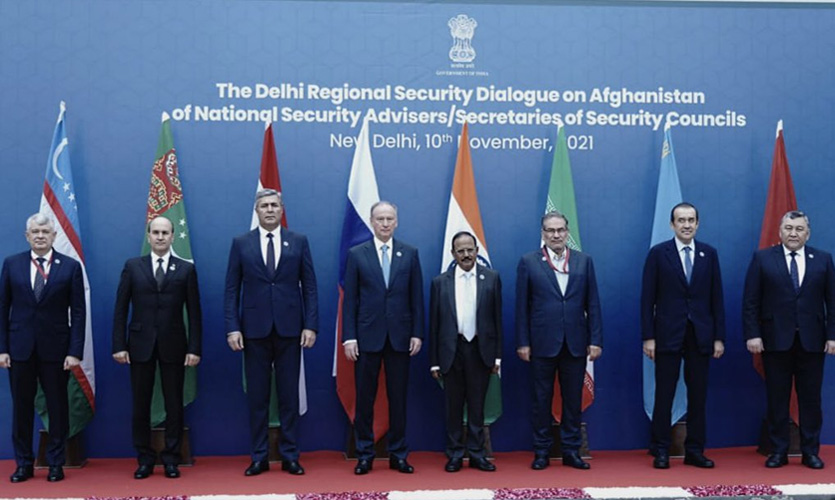National Security Advisor (NSA) Ajit Doval said on Wednesday that the Taliban takeover of Afghanistan has implications not just for its immediate neighbours but for the region as a whole, which is why it is important to have “greater cooperation and coordination” and build a regional security structure.
Doval, who chaired the third meeting of the Regional Security Dialogue initiated by Russia, said: “We all have been keenly watching the developments in that country (Afghanistan). These (Taliban’s takeover of Afghanistan and formation of the interim government) have implications not only for the people of Afghanistan but also for its neighbours and the region. This is the time for close consultations amongst us, greater cooperation and coordination among the regional countries.” He added that the talks “will contribute to helping the people of Afghanistan and enhancing our collective security”.
Also in attendance were Deputy NSA Pankaj Saran, Foreign Secretary Harsh Vardhan Shringla, and MEA’s Joint Secretary J.P. Singh. NSA Doval was joined by his counterparts from five Central Asian nations – Kazakhstan, Kyrgyzstan, Tajikistan, Turkmenistan and Uzbekistan – along with representatives from Russia and Iran. The group discussed how to develop a common approach for practical cooperation to counter-terrorism, radicalisation, and drug trafficking following the Taliban’s takeover of Afghanistan.
These are the third round of talks between the security chiefs of Russia, India, China, Pakistan, Iran, and the five Central Asian countries. The first two rounds of the dialogue took place in Tehran in 2018 and 2019. India was slated to host the meeting in 2020, however, it was postponed due to the COVID pandemic. Pakistan’s NSA Moeed Yusuf rejected India’s invitation while China did not attend Wednesday’s meeting citing scheduling conflicts.
In response to Pakistan and China’s absence Iran said that it was vital to establish a joint mechanism for handling the Afghanistan issue that involved all countries in this region. The Iranian delegation was led by Rear Admiral Ali Shamkhani, Secretary, Supreme National Security Council.
“India has played a great role in Afghanistan… Today Afghanistan is facing terrorism, poverty and misery, unfortunately. Basically, Afghanistan is only facing crisis and there is also the crisis of migration and refugees,” Shamkhani said. According to Shamkhani, the solution can only come with the formation of a government that is inclusive of all ethnic groups, and so it is important to determine who will be the force and what mechanisms should be in place.
While expressing concern over the absence of Pakistani and Chinese security heads he said that we should be able to resolve the crisis by working together. Russia commented that by taking practical steps to arrest threats emanating from within Afghanistan, the Delhi Regional Security Dialogue will help in “restoring peace” in the country. Russian Secretary Nikolai P. Patrushev said that this format of talks, which includes the Moscow Format of the Afghan dialogue, should continue. Even as he highlighted the importance of exploring through these dialogues the path to “long-term peace” in the war-torn country he said that the evolving situation in Afghanistan should be given the highest priority.
According to Kazakhstani National Security Committee Chairman Karim Massimov, the situation in Afghanistan has become “complicated” since the fall of Kabul.
“There are many obstacles to form an effective government system (in Kabul)… terrorist organisations are intensifying their activities. We are strongly concerned with the operations of the Central Asian fighters. The social and economic situation in Afghanistan is deteriorating and the country is facing a humanitarian crisis,” said Massimov. In the face of the humanitarian crisis taking place in the country he urged the international community to get involved.
Kyrgyzstan’s Secretary Marat Mukanovich Imankulov also addressed the growing activities of terrorist outfits in Afghanistan.
Tajikistan’s Secretary Nasrullah Rahmatjon Mahmudzoda expressed concern over the political stability in Afghanistan and the liberties of the Afghan people, noting that his country is more concerned due to its long border with Afghanistan. “The current situation in Afghanistan poses an extra risk of drug-trafficking, extremism and criminality,” said Mahmudzoda, adding that Tajikistan and Afghanistan border remains “complicated” due to many factors.
According to Charymyrat Kakalyyevvich Amavov, the Deputy Chairman of Cabinet of Ministers of Turkmenistan on Security, and Secretary of the State Security Council, “What happened in Afghanistan in a short amount of time should spur all countries to work together.” According to Victor Makhmudov, Secretary of the Security Council under the President of Uzbekistan, the situation in Afghanistan is “difficult” and an effective solution for bringing peace to the country is imperative.
Read more: India, Taliban To Hold Talks At Russia’s Moscow Format Meeting
It was reported that NSA Doval would hold three additional bilateral meetings with Patrushev, Shamkhani, and Massimov. Mahmudzoda and Makhmudov met separately with Doval on Tuesday.
Recently, India has been engaged in dialogue on Afghanistan at several levels, both regionally and multilaterally. As far as Central Asian countries are concerned, India maintains regular and intense interactions with their security establishments. According to sources, Indian officials who participated in the Moscow-style talks vowed to stand by the Afghan people by offering aid, but no final decision could be reached on how the aid will be delivered and through what channels.










